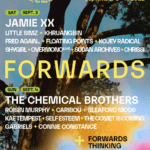Generation Black TV - Live
Rosalia Propels Spanish Speaking Music to Forefront of Alt-Pop on Motamami
Since Motamami’s release, Rosalia has had phenomenal critical success, which cemented her as a “rising star,” and the “future direction” of popular music.
Over the past few weeks, critics have complemented Rosalia on her ability to fuse a collection of avant-garde, experimental pop and alternative reggaeton sounds into one body of work. The Spanish singer’s third album has become a turning point in her career, and now the music industry, of which she dominates.

© Financial Times
Born in a suburb of Barcelona, a young Rosalia Vila Tobella began experimenting with Spanish folkloric music. Equipped with niche passions, Rosalia then attended Catalonia College of Music, where she produced multiple bodies of work, including the breakout hit album: El Mal Querer.
El Mal Querer helped Rosalia make the transition from recent graduate to a respected artist in the international alternative music scene. The album – written by Rosalia – merged her experience with toxic relationships into the unexpected context of a 13th century Occitan novel Flamenca. This explains the unusual layout of the album: every song is conceived as a chapter of a book. This inventive approach to making music suddenly became Rosalia’s signature.
In a recent interview with ID Magazine, Rosalia reflects on the early years, “There was never this entity, this person saying anything. I wasn’t even signed when I made my first album. You know what I mean? I feel like it took me a long time to figure out who I am and what my music is and what I want to do. It happened overnight from a marketing perspective, but that doesn’t mean I wasn’t working towards that moment. My parents weren’t connected at all to the industry. It was starting from zero.”
Rosalia’s rise to stardom is refreshing and inspirational for many. It isn’t very often an artist arrives onto the world stage from their own making. In pop particularly, stars with potential are moulded into a package that is “more appealing” to mainstream audiences. And in this process, artists lose their identity, and their uniqueness is often diluted. But in Rosalia’s case, she is a pop star who owns her aesthetic and has no intention of appeasing.

© Rosalia Press Photos
“I don’t really like to look back,” says Rosalia to Rolling Stone, referencing El Mal Querer and earlier works. It took Rosalia almost three years to conceptualise, write and produce the follow-up record, Motamami. In this time, Rosalia spent a lot of time touring, which exposed her to a world of different cultures and sounds – a far cry from the Flamenco inspired back catalogue.
“In this new album, there’s some humour,” Rosalia continues in her interview with ID Magazine. Humour is a theme injected in Motamami, and it is even noticeable in song titles, such as ‘Chicken Teriyaki’. But don’t be fooled, as Motamami is no light-hearted album. In fact, it’s Rosalia’s deepest and most personal work yet.
https://www.youtube.com/watch?v=aAtUnqdTz2g
Like many women in the music industry, Rosalia is frustratingly compared to other artists. In this case, Shakira. Although both bare similarities in the meteoric rise to fame, and Spanish speaking music, they both have completely different attitudes towards music and the industry. For Rosalia, it’s personal, and regardless of the Shakira-like fame that inevitably follows, Rosalia will hopefully remain grounded by her love and appreciation for music – because Motamami exudes it.


